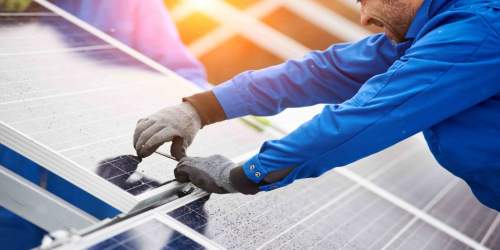Read Time : 6 Minutes
What is Solar Energy
What Can Solar Energy Do for You?
Solar energy can be hugely beneficial to you. It allows you to generate electricity that is not only cheap, but also incredibly green so that you can have a positive impact on the environment. After all, solar energy is one of the best natural resources that the solar system can provide us with. When you use solar energy, no pollutants are emitted into the atmosphere – regardless of whether you are producing or consuming it. In fact, a large number of people have found themselves switching to solar energy, and the number just keeps increasing. This is not just because of how green it is. Over the years, solar energy has been continually developed, and it is now cheaper to set up and run, but also far more efficient than it used to be. It’s incredibly easy to have panels installed at your home to provide you with electricity and even hot water as well as heating. The process of deciding whether or not you want solar panels, as well as choosing between solar panels and thermal panels, can be a long one. So whether you are looking to get them for use at home or in business, we have a few important and interesting things that you should know.
Is Solar Energy Something You Want to Buy?
Of course, you will likely have a lot of question about solar energy if you are considering investing in it, and we are here to help you throughout the decision-making process. We offer a service that is completely free from obligations – it’s as simple as that. All you need to do is fill in the form on this page (which is completely non-binding) and a member of our professional team of installation experts will contact you with their best offers. Plus, they will answer any questions you might have about the service and the process. It can save you a lot of time and research, which can be quite handy. In addition to this, if you like any of the offers they give you over the phone, you are free to choose it there and then. Of course, if you want to do a little research on solar energy before you talk to our team, take a read of the rest of this page.
COMPARE PRICES FROM LOCAL INSTALLERS
Compare prices from local companies fast & free
Enter your postcode to compare quotes from leading professionals. We promise to keep your information Safe & Secure. Privacy Policy
The Benefits of Solar Power
There are quite a few benefits to using solar power in your home or place of work. Here are a few of the main ones: You don’t need any planning permission. It can be a bit of a headache to get planning permission for alterations to our home, and this is part of what makes solar energy so good. They are considered to be permitted development, so you can just go ahead and install them. However, make sure you check things out with your local council first as there are a few limitations and obligations you may need to consider first. They work everywhere. There’s a myth that solar panels don’t really work in the UK. They can actually work absolutely anywhere, even when it is cloudy outside. Of course, their efficiency increases in proportion to the amount of sunlight they receive, but the sun doesn’t need to be shining for you to benefit from the energy it produces. It is also free. Once the system for the generation of energy via solar power has been installed, the heating or electricity that is generated from it is completely free. This massively reduces your energy bills and also keeps your carbon footprint low. You can even store excess energy in a generator or sell it back to the National Grid. It's clean energy. Solar energy doesn’t release any harmful substances into the atmosphere or cause noise pollution when it’s active and running. For each megawatt of electricity produced per hour, solar energy produces 0.75 of a tonne of CO2.
How Does It Work?
Of course, it’s important to know how the process of solar energy works. In simple terms, solar energy is energy that has been provided by the sun. When it is converted into solar power, it can then be used to provide electricity or heating for your home or business. Solar power itself is generated by a surface that collects energy (generally solar panels), and a form of converting the captured energy into heat or electricity. There are two main ways that solar energy can be converted into solar power. Photovoltaic Conversion (PV). Also known as direct conversion. This is the most commonly used form of generating solar energy and involves the use of solar panels, or solar PV, for the generation of electricity. Solar Thermal Conversion. Also known as Indirect Conversion. This form is used to generate heat and is starting to grow in popularity. It involves using a thermal collector to generate the heat so that your water or home can be warmed using solar power. As we have just detailed, there are two main uses for solar energy when it comes to the creation of solar power – heating and electricity. It’s important to remember that if you are planning on generating electricity, then you will need to have solar panels installed. For the generation of heat, you will require a thermal collector instead.
Using Solar Energy for Electricity
Solar panels can be used to convert solar energy into electricity. This method of gathering and harnessing solar energy works in a way that is similar to the methods for solar energy being used to generate heating. When the solar panel is installed on the roof of your household, the light from the sun that hits it is captured, converted, and then stored for future use. When you have the panels installed, you are able to choose between a stand-alone PV system on one that is connected to the grid. The primary difference between these two models is that the stand-alone version will store the solar energy for your personal use, so you can have excess backed up in a generator. The grid connected system, however, will send excess energy to the National Grid, allowing you to earn money from them for the excess energy that you provide.
How Do Solar Panels Work?
A common question is one that asks how solar panels actually work, and it’s important to know before you commit to buy one. The name photovoltaic cells (PV) comes from Greek, with photo meaning “light” and voltaic “electricity”. This is because they work by converting sunlight directly into electricity. The solar panel itself is a group of cells that are connected electrically and grouped into one frame. A group of solar panels together form what is known as a solar array. PV cells are made from special materials called semiconductors, and these are usually constructed from silicon. When the light hits the solar cell, some of the energy is absorbed, and the electrons from the atoms in the semiconductors are released. When the electrical conductors themselves are attached to positive and negative sides, an electrical circuit is formed. This allows the electrons to be captured in the form of an electric current. Together, with the voltage provided by the cells, the current defined the level of power that the solar cell is able to produce. The voltage is a result of the built-in electric fields that it contains. Find out more about how do solar panels work.
Frequently Asked Questions
Are they expensive? Usually, when something becomes popular, the price tends to increase. However, this is not the case for solar energy. As its use and popularity grows, the price of PV cells has been dropping massively. The price now is 99% lower compared to 1976 – which is amazing. Plus, the government even awards grants for its installation because it is such an environmentally friendly form of energy production. If we look at the current electricity costs alongside models levels of inflation, the payback period for solar panel purchase and installation should be just under ten years. Will they work in bad weather conditions? The short answer to this question is yes. Solar PV panels are able to gather solar energy throughout the year, no matter the season or the weather. However, when there is no direct exposure to the sun the conversion of solar energy from the panels is reduced. This means that if a day is particularly cloudy, the solar panels will only be working at half of their total capacity. On days that are extremely cloudy, this number could drop by an additional 10%. How much space will I need on my roof? Generally speaking, you will need around 100 square feet of space in order to generate 1 KW of solar energy. The average household tends to use around 40-50KW of electricity per day. So, if you are looking for your electricity and heating requirements to be met by solar energy, it is safe to assume that you will need around 500 square feet of roof space. However, even harnessing half the energy that you consume from the sun can cut your energy bills in half, so 250 square feet could also suffice. What is the lifespan of a solar panel? The average lifespan of a solar panel is around 30 or 40 years. During this time, they should provide a regular amount of energy without decline or need for replacement.
Using Solar Energy for Heating
In this process, solar energy is converted into heated water which is then made available for use in your household (or even business). The solar water heating system is also known as a solar thermal collector system. The energy produced by the sun is attracted by collectors, flat plates or evacuated tubes, that have been installed on your roof. Hot water is then transported through the tubes for use in the building. Generally speaking, the solar water heating system is able to provide around one-third of the hot water needs for a family of four.
What it Costs and What You Save
An exact price for the purchase and installation of solar panels is difficult to give on this page. This is because it depends on several factors such as:
- The size of the panels
- The type of panel chosen
- The weather in the area
- Possible grants from the government
- Difficulty of installation on the roof (access, size, etc.)
If we were to give an incredibly rough estimate, then it would be between £5,000 and £10,000 for a solar panel system. For the thermal systems, another rough estimate would be between £3,000 and £5,000. Remember that these figures are a very rough guide. Don’t take these numbers into isolation either. You have to consider the savings that will be made when you have one installed in your home, as well as the money that could be earned from selling excess energy to the grid. Your energy bills can be greatly reduced by the installation and use of solar panels in your home. Plus, it reduces your impact on the environment.
Maintenance
One of the great things about solar panels is that they require very little maintenance, so you won’t find yourself pouring money into them. Of course, it is important to ensure that they have not been blocked by dirt or trees as this can hinder their productivity. If you angle the panels well, then rainfall will also be able to help keep the dirt off, ensuring the panels are clear and unobstructed. The solar panels themselves should last for around 30 years. However, please note that the inverter may need to be changed before this time, which costs around £800.
Get Your Free Quote
All that’s left for you to do is come and get a free quote from us. We’re here to help you find the best possible deal, and we understand that finding the right supplier can take time as well as research. By filling in our no obligation contact form (found on this page), we can contact you to discuss some of our best offers, and you can speak with one of our professional and expert installers. We can’t wait to hear from you!
Find a local installer
Welcome to the biggest directory of UK renewable energy companies





 How Much do Solar Panel Systems Cost in 2024?
How Much do Solar Panel Systems Cost in 2024?







